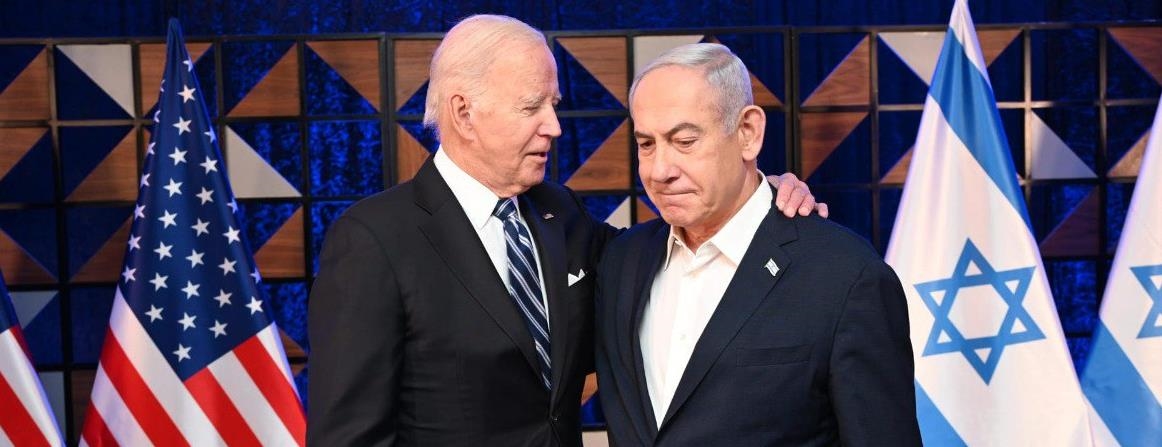US President

Normalization of Israel-Saudi ties under US sponsorship
| OpinionIn recent days, news suggesting progress in the discussions between the United States and Saudi …
-
Opinion
Normalization of Israel-Saudi ties under US sponsorship
By Kadir ÜstünIn recent days, news suggesting progress in the discussions between the United States and Saudi Arabia, and approaching the stage of agreement, could herald a new era in the Middle East. Saudis are seeking support from the United States to develop 'peaceful' nuclear technology in response to Iran's nuclear capacity, as well as security assurances in the event of a potential war. The agreement, which includes cooperation in advanced technology and distancing from China, is critical for the Biden administration, as its support depends on it. However, it will be challenging for a government led by Netanyahu, who has always opposed the establishment of a Palestinian state, to accept the insistence of the Saudis on stopping the Gaza war and a two-state solution. The Biden administration aims to use the normalization of relations between Israel and Saudi Arabia to sideline the Gaza issue and appear to have 'resolved' the Palestinian issue by the November elections, but Netanyahu remains the biggest obstacle to this.
-
Opinion
Ramadan, Gaza and anti-Islam sentiment
By Burhanettin DuranFriday marked the fifth day of Ramadan. Unfortunately, there is still no cease-fire in Gaza, and Israel continues to kill Palestinians waiting for food supplies. Earlier this week, Israeli troops killed six Palestinians and injured 83 others as they waited in line to receive a bag of flour. That was not the first time, and it won’t be the last.
-
Opinion
Aren’t we already in the midst of a regional war?
By Kadir ÜstünWe're talking about the possibility of Israel's attacks on Gaza triggering a regional war after October 7. Recent developments actually indicate that we are already in the midst of a regional war. However, the fluctuating intensity of such conflicts and the fact that the parties involved are not always clearly defined make it difficult to label it as a regional war. The evolution of warfare between countries, occurring in complex ways across different arenas and activating the capacities of various parties, has made traditional, all-encompassing wars increasingly rare. Many countries now prefer proxy wars due to their lower cost, lower risk, and deniability.
Bu Konuda Daha Fazla
-
Washington’s efforts for ‘damage control’ in Israel
By Kadir ÜstünDuring his visit to Israel, U.S. Secretary of Defense Lloyd Austin reiterated the Biden administration's support but conveyed the message that operations should be more limited. Austin, who previously stated that Israel faced the risk of 'strategic defeat,' is believed to be delivering the message that winning the war in urban combat requires gaining civilian support. The U.S. administration reportedly urged Israel to reduce the intensity of operations by the end of the year and increase humanitarian aid passages. While continuing support for Israel, the Biden administration seems to be trying to limit the political cost generated by the humanitarian crisis in Gaza.
-
What does Biden’s criticism of Netanyahu mean?
By Kadir ÜstünBiden, in a ceremony where he criticized antisemitism this week, recounted the political pressures he faced for stating 35 years ago, 'Being Jewish is not necessary to be a Zionist. And I am a Zionist.' Biden has previously used expressions like 'If there was no Israel, we would have to invent it' and linked the security of Jews to the existence of Israel. It can be politically surprising that Biden, in his second term, insists on his Israel policy, risking American national interests. The only explanation for Biden's insistence might be an irrational and ideological perspective based on assumptions that many Jews might not accept.
-
Assessing the US Executive Order on AI from a...
By Gloria Shkurti ÖzdemirOn October 30, 2023, President Biden took a significant step by signing an executive order that charts a course for the utilization of AI in the United States, aiming to both harness its potential and mitigate the associated risks. Before this directive, it's crucial to note that President Trump made history by signing two executive orders in 2019 and 2020, marking the initial official forays into AI governance by an American president. Trump's focus primarily centered on how the government uses AI and strategies to maintain U.S. leadership in this field. In contrast, since assuming office, President Biden's official approach to AI has predominantly emphasized ethical and responsible implementation. His primary focus is ensuring that the application of AI adheres to ethical standards and societal responsibility, particularly in its impact on American citizens.
-
Washington’s Gaza deadlock
By Kadir ÜstünThe Biden administration hasn't fundamentally altered its unwavering support for Israel since the beginning of the crisis. However, in the face of heavy criticism from the international community, regional countries, and even its own party and American public, especially in the past two weeks, it has started emphasizing the humanitarian crisis more. As Washington increasingly finds itself isolated on the international stage, it has begun to add qualifiers, such as the need to protect civilians and ensure humanitarian aid access, while reiterating its full support for Israel. Reports have also suggested that Israel is preparing for a large-scale invasion of Gaza, but Washington is recommending a narrower operation that takes into account the safety of hostages and civilians. The change in rhetoric seems to reflect the administration's growing awareness of the need to alleviate public pressure.
-
Who is responsible for theological drift: Netanyahu or West?
By Burhanettin DuranWhile the Israeli army continues its occupation of Gaza step by step, that country’s prime minister, Benjamin Netanyahu, attempts to justify the killing of Palestinians with reference to the Torah. In the immediate aftermath of Hamas’s Oct. 7 attack, Netanyahu embraced Jewish theology by bringing up the Prophecy of Isaiah regarding the “promised land.”

















